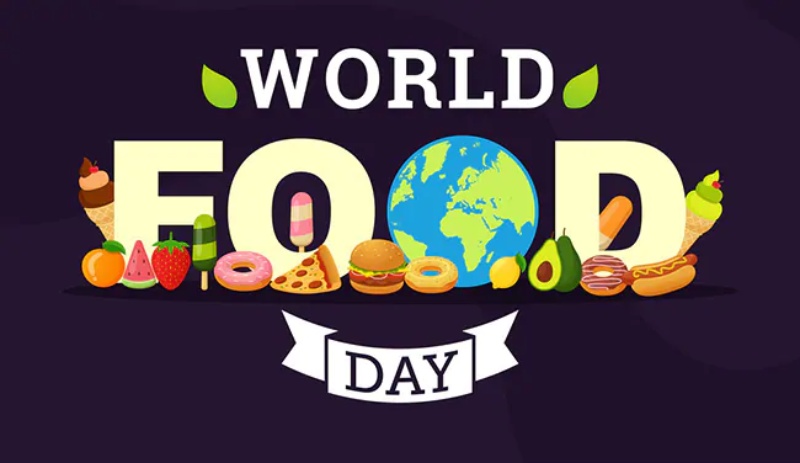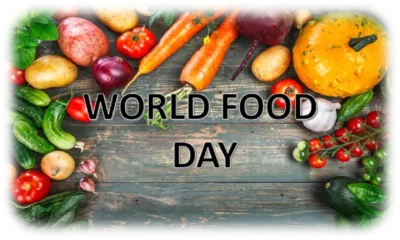Festivals & Events
World Food Day: Building Sustainable Nutritional Growth For Today’s Generation With Superfoods

Superfoods are nutrient-dense foods that have a wide range of positive health effects. Within the wellness sector, they are highly regarded. For example, putting “superfood” into a popular e-commerce search engine returns page after page of readily accessible vitamins, dried fruits, coffee creamers, and green tea powders that are labeled as superfoods. To accomplish a fitness goal and optimize the health advantages these superfoods provide, it becomes imperative to keep an eye on and control the quality of food consumption until a particular age to monitor growth and development.
Here are several ways that superfoods, when consumed sustainably, contribute to the development of the current generation.
Keep grounded to improve nutrition
Local people have been sustainably using these crops for millennia. But now since they are considered “superfoods,” they are well-liked and in high demand all around the world. Vegetables are in right now! There are countless vegetarian and vegan dishes that you may create to help keep things interesting and satisfy your nutritional needs. Fortunately, a wide range of exciting foods, referred to as “regional superfoods,” are available to taste throughout the year. Beyond berries, there are other locally grown superfoods. The nutritional value of pears and apples, as well as nuts and seeds like chia, flax, and pumpkin seeds, is on par with that of other fruits. In this case, balance is just as important as origin and cultivation techniques.
For instance, millet, the first grain grown by humans, has the second-highest calcium and magnesium concentration after quinoa. Millet is relatively easy to digest and naturally abundant in iron. Even snack foods like chips might contain it as a flavoring. Buckwheat’s nutty flavor complements both morning porridge and vegetable burger stuffing.
Increasing nutritional IQ through sustainability
Sustainable diets ensure food and nutrition security, encourage a healthy lifestyle for both the present and future generations, and have no detrimental impact on the environment. Sustainable meals maximize environmental and human resources while providing enough nutrition. Additionally, they are affordable, accessible, and eco-protective, as well as equitable from an economic perspective. A sustainable diet makes it possible to preserve one’s health and guarantee that the globe has adequate resources to feed coming generations of people. A sustainable diet considers how it will impact the entire food chain, the environment, and the individual. How sustainable a diet is affected by the following factors:
- dietary accessibility
- relative price
- protection of the ecosystem’s variety
- general wellbeing
If all of these factors are taken into account, the planet should be able to continue generating adequate food and resources for a growing population as well as for future generations.
Sustaining a sustainable diet’s efficacy
There are several steps to take into consideration to help a person lessen their influence on the environment and improve their health before beginning to make dietary changes to optimize the benefits of a sustainable diet. Increase your consumption of nutrient- and vitamin-rich fruits, veggies, and grains to greatly improve your health. The best plant-based proteins, including tofu and beans, come from plants and are regarded as being environmentally benign.
The risk of switching to a sustainable diet is often low to nonexistent. If a person makes deliberate steps to ensure that they do so, they can still satisfy all of their nutritional needs by consuming fewer animal products and more plant-based foods. The emphasis of a sustainable diet is on consuming more whole-plant foods. People may still choose to eat animal products, just in much lower proportions.
We must place a significant emphasis on sustainable, nourishing diets in honor of World Food Day to motivate people to embrace healthier eating practices and promote sustainable, nourishing growth. It becomes more affordable and simple to manufacture eco-friendly food in big quantities when it is supplied locally, regionally, or according to the season, making it a more practical lifestyle choice.
-

 Business3 weeks ago
Business3 weeks agoNayef Doleh Examines International Humanitarian Fundraising Strategies
-

 Business3 weeks ago
Business3 weeks agoHow to fill MSME Form 1? Step-by-Step Guide
-

 Business4 weeks ago
Business4 weeks agoHow Black Banx is Redefining Global Banking Strategies in 2025
-

 Festivals & Events3 weeks ago
Festivals & Events3 weeks agoInteresting Facts about St. Patrick’s Day
-
Business3 weeks ago
From Marine to Chief: The Leadership Journey of Sean Mannix
-

 Food4 weeks ago
Food4 weeks agoGeorgiy Balyuk Highlights Savannah’s Charm and Houston’s Best Eats
-

 Gadget2 weeks ago
Gadget2 weeks agoAfter Grand Success on BLDC Ceiling Fan, Eff4 Is Launching Smart Bulb
-

 Festivals & Events3 weeks ago
Festivals & Events3 weeks agoGoogle Celebrates Cherry Blossom Season with Animated Doodle
















